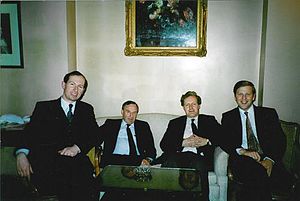- Conservative Monday Club
-
The Conservative Monday Club (widely known as the Monday Club) is a British pressure group "on the right-wing" of the Conservative Party.[1]
Contents
Overview
Founded in the early 1960s during the party's internal debate over decolonisation, its published aims state that "The Monday Club seeks to evolve a dynamic application of traditional Tory principles".[2] Roger Griffin referred to the Club as practising an anti-socialist and elitist form of conservatism.[3]
The club is notable for having promoted a policy of voluntary, or assisted, repatriation for non-white immigrants,[4][5] which mirrored the pledge made in the Conservative Party's General Election Manifesto of 1970.
After its 1997 general election defeat, the Conservative Party began decisive moves towards becoming more centrist; the 2002–2003 party chairman, Theresa May, would later state that it had been perceived by voters as the "Nasty Party". The then party leader, Iain Duncan Smith, suspended the Monday Club's longstanding links with the party in October 2001,[6] saying his party would have nothing to do with the organisation unless it stopped making "distasteful" remarks on race and immigration.[7]
Since 1993 new full members of the club must be members of the Conservative Party, though there is no such requirement for associate membership.[8] Monday Club observers, such as Denis Walker, have attended Democratic Unionist Party (DUP) conferences.
Part of the club's agenda stresses support for what it calls "traditional Conservative values", including "resistance to 'political correctness'".
History
Foundation and early years
The club was founded on 1 January 1961, by four young Conservative Party members, Paul Bristol (a 24 year-old shipbroker and the Club's first Chairman,[9] who left the Club in 1968), Ian Greig (Membership Secretary until 1969), Cedric Gunnery (Treasurer until 1992) and Anthony Maclaren. The club was formed "to force local party associations to discuss and debate party policy". Its first general policy statement deplored the tendency of recent Conservative governments to adopt policies based upon expediency and demanded that instead Tory principles should be the guiding influence. It believed that the principles needing to be reasserted included the preservation of the constitution and existing institutions, the freedom of the individual, the private ownership of property, and the need for Britain to play a leading part in world affairs.[10] It disliked what it regarded as the expediency, cynicism and materialism which motivated Harold Macmillan's government. In addition it was concerned that during this period "the left wing of the Party (had) gained a predominant influence over policy" and that as a result the Conservative Party had shifted to the left, so that "the floating voter could not detect, as he should, major differences between it and the Socialists" and, furthermore, "loyal Conservatives had become disillusioned and dispirited."[11]
The group initially brought together supporters of White Rhodesia and South Africa; the main impetus for the group's formation was the Conservative's new decolonisation policies, in particular as a general reaction to Macmillan's 'Wind of Change' speech made at Cape Town, South Africa. The club stated that Macmillan had "turned the Party Left", and their first pamphlet opposed these policies, as indicative of the Conservative Party's move towards liberalism.[12]
The 5th Marquess of Salisbury (1893–1972), who had resigned from Macmillan's Cabinet over the Prime Minister's liberal direction, became its first president in January 1962, when he stated "there was never a greater need for true conservatism than there is today".[13] By the end of 1963 there were eleven Members of Parliament in the Club, which then only had an overall membership of about 300.[14]
The Club was courted by many Conservative politicians, not least the Conservative Party leader Alec Douglas Home who was guest-of-honour at the Club's annual dinners of 1964 and 1969, and Enoch Powell, who, in a speech in 1968, claimed that "it was due to the Monday Club that many are brought within the Conservative Party who might otherwise be estranged from it".[15] Some argued that the Club had a disproportionate influence within Conservative circles, especially after six of its MPs joined the Cabinet in 1970.[16]
Harold Wilson, twice Labour Prime Minister, sarcastically described the club as "the guardian of the Tory conscience".[15]
Members
By 1970 eighteen Members of Parliament were Club members:[17]
- Geoffrey Rippon (Hexham)
- Julian Amery (Brighton Pavilion)
- Ronald Bell QC (South Buckinghamshire)
- Harold Gurden (Selly Oak)
- Teddy Taylor (Glasgow Cathcart)
- John Peyton (Yeovil)
- Joseph Hiley (Pudsey)
- John Biggs-Davison (Chigwell)
- Stephen Hastings (Mid Bedfordshire)
- Victor Goodhew (St Albans)
- Wilfred Baker (Banffshire)
- Jasper More (Ludlow)
- Jill Knight (Edgbaston)
- Patrick Wall (Haltemprice)
- Mark Woodnutt (Isle of Wight)
- Sir Jerry Wiggin (Weston-super-Mare)
In the 1970 Conservative Party election victory, six club MPs were given government positions.[18] In addition, the following club members were elected that year:[17]
- Geoffrey Stewart-Smith (Belper)
- Patrick Cormack (Cannock)
- Anthony Fell (Great Yarmouth)
- Robert Boscawen (Wells)
- Harold Soref (Ormskirk)
- William Benyon (Buckingham)
- Roger White (Gravesend)
- Peter Rost (South East Derbyshire)
- Norman Tebbit (Epping)
- Piers Dixon (Truro)
- David James (North Dorset)
- John Heydon Stokes Oldbury and Halesowen)
Among sitting MPs who joined the Club after the election and other elections were:
- Sir Stephen McAdden (Southend East)
- Richard Body (Holland with Boston)
- Sir Ronald Russell (Wembley South)
- Colin Campbell Mitchell (West Aberdeenshire)
- Robert Taylor (Croydon North West)
- Nicholas Winterton (Macclesfield)
- Ann Winterton (Congleton)
A number of other Monday Club members contested Labour-held seats, some of which had large majorities, and although the challenge was unsuccessful the majorities were reduced. These included Tim Keigwin, who almost unseated the Liberal leader Jeremy Thorpe at North Devon, and David Clarke who failed by only 76 votes at Watford.[19]
By 1971, the Club "undoubtedly had the largest membership of any conservative group and included 55 different groups in universities and colleges, 35 Members of Parliament with six in the government, and 35 Peers".[19] Enoch Powell was a constant supporter of the club until his death, although he never took up membership.
John Biggs-Davison, MP, in his Foreword to Robert Copping's second book on the history of the club,[20] stated that "by its principles [the club] has kept alive true Tory beliefs and held within its ranks many who contemplated defecting from the Conservative and Unionist Party". The club's Chairman, David Storey, described it in June 1981 as "an anchor to a ship", referring to the Conservative Party.
The Thatcher years
 Three of the Young Members' Group at a Club Conference at Chilham Castle, 1980: John R. Pinniger (YMG Chairman), Richard Turnbull, & Gregory Lauder-Frost.
Three of the Young Members' Group at a Club Conference at Chilham Castle, 1980: John R. Pinniger (YMG Chairman), Richard Turnbull, & Gregory Lauder-Frost.
The club's revised Constitution (21 May 1984) stated that "the objects of the Club are to support the Conservative & Unionist Party in policies designed:
- to maintain loyalty to the Crown and to uphold the sovereignty of Parliament, the security of the realm, and defence of the nation against external aggression and internal subversion;
- to safeguard the liberty of the subject and integrity of the family in accordance with the customs, traditions, and character of the British people;
- to maintain the British constitution in obedience and respect for the laws of the land, freedom of worship and our national heritage;
- to promote an economy consistent with national aspirations and Tory ideals;
- to encourage members of the club to play an active part, at all levels, in the affairs of the Conservative and Unionist Party."
During the period that Margaret Thatcher led the Conservative Party, the Monday Club were prolific publishers of booklets, pamphlets, policy papers, an occasional newspaper, Right Ahead, and a magazine Monday World edited for some years by Sir Adrian FitzGerald, Bart., Sam Swerling, and later, Eleanor Dodd. In the October 1982 edition MP Harvey Proctor called for the scrapping of the Commission for Racial Equality, Sir Patrick Wall commented on the 'Falkland Islands Campaign', James Molyneaux had an article 'What Future for Ulster', and Dr. Harvey Ward had an article on 'Zimbabwe Today'. The September 1984 edition of Monday News carried the headline 'Kinnock Talks to Terrorists', quoting former Labour Party leader Neil Kinnock's declaration to the South African African National Congress's Oliver Tambo that the ANC in South Africa could expect financial and material assistance from a future Labour government. Other attacks were made upon then-Greater London Council leader Ken Livingstone inviting Sinn Féin leader Gerry Adams to visit London in 1982.
Old Guard departs
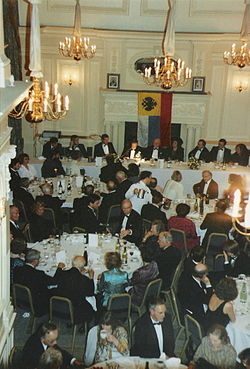 The Foreign Affairs Committee were responsible for the Club's Russia Dinner on 11 January 1990, with Vladimir Cyrillovich, Grand Duke of Russia, pretender to the Imperial throne, being the guest-of-honour.[21][22]
The Foreign Affairs Committee were responsible for the Club's Russia Dinner on 11 January 1990, with Vladimir Cyrillovich, Grand Duke of Russia, pretender to the Imperial throne, being the guest-of-honour.[21][22]
In 1988–9, a group of longstanding members led by Gregory Lauder-Frost, the club's Foreign Affairs Committee chairman, succeeded in getting elected to the key posts on the Executive Council, with Dr. Mark Mayall as Deputy Chairman, and Lauder-Frost as the Political Secretary.
At the beginning of January 1991, the Monday Club News announced the abolition of the only salaried position, that of Director (then held by the Club's Treasurer, Cedric Gunnery, one of the Club's founders). Although this was entirely due to the Club's precarious financial state,[23] some felt more sinister moves afoot. Negative news stories began emerging[24][25] and resignations followed. An internal investigation followed. The chairman, David Storey, lost an almost unanimous vote of no confidence on 17 January 1991, and his membership was terminated by the Club's Executive Council on 11 February on the grounds that "he has engaged in behaviour prejudicial to the best interests, reputation, objects, and other members of the Monday Club; by abusing his position as Chairman in encouraging members to leave the Monday Club and to join a new political group".[26][27] Dr. Mayall became Acting Chairman until the May AGM when he was confirmed in that post by election. By 1992, the new team had the national membership over 1600 again.
Personal legal problems forced Lauder-Frost's departure on 31 May 1992 and subsequently the Club descended into in-fighting, with more departures and failed expulsion attempts resulting in huge legal bills. Dr. Mark Mayall's term as Chairman expired in April 1993 and he left the group. Control passed effectively into the hands of Denis Walker, a former Minister for Education in the Rhodesian government. He changed the role of the club from a pressure group to a Conservative Party support group, bringing in a rule that all members must firstly be members of the party, something that prior to 1992 had been constantly opposed.
Organisation
Premises
The national club established itself in offices at 51-53 Victoria Street, a few minutes walk from the Palace of Westminster. The club was, however, always a pressure group, remaining separate from the Conservative Party organisation. Around 1980, the Victoria Street building was cleared for demolition, and the club moved its offices to 122 Newgate Street, London, EC1, opposite the Old Bailey. High rents forced another move to 4 Orlando Road, Clapham Common, and finally, in 1991, the club's office was moved to an office belonging to W. Denis Walker, opposite Highams Park railway station, with new telephone numbers, and a new Post Office Box number in central London. The newsletter stated that "it is our long-term aim to relocate back to the very heart of London".
Branches
In addition to the national club, which operated through an elected Executive Council and numerous policy groups or committees, there were semi-autonomous county branches, a Young Members Monday Club, and numerous university Monday Clubs, the most prominent and active being at the University of Oxford.
Policy committees
The Monday Club had various study groups (later renamed policy committees) including:
- Immigration and Repatriation: notable chairmen being George Kennedy Young, Jonathan Guinness, and K. Harvey Proctor, MP; (John Bercow, now an MP and Speaker of the House of Commons, was committee secretary 1981-82, whilst a student);
- Africa and Rhodesia: Harold Soref, MP;
- Home Affairs;
- Aviation;
- Economics: George Kennedy Young
- Ulster;
- Taxation: David Rowell
- Universities Group;
- Defence: The Hon. Archibald Hamilton, MP, Patrick Wall, MP, and Commander Anthony Courtney (former MP for Harrow East); and
- Foreign Affairs: Geoffrey Stewart-Smith, MP (joined Club 1964), John Carlisle, MP, and Gregory Lauder-Frost.
Foreign affairs
Anti-communism
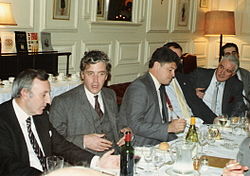 At the Western Goals Institute's 'El Salvador' Dinner, London, 25 September 1989. L to R: Denis Walker, Lord Sudeley, El Salvador's Foreign Minister, Andrew Smith (yellow tie), Dr. Harvey Ward
At the Western Goals Institute's 'El Salvador' Dinner, London, 25 September 1989. L to R: Denis Walker, Lord Sudeley, El Salvador's Foreign Minister, Andrew Smith (yellow tie), Dr. Harvey Ward
The Club was anti-communist and had an active Defence Committee chaired for over 15 years by Sir Patrick Wall, MP, MC, and produced much literature on the perceived threat posed by Soviets and communists everywhere.
When it appeared that communism was failing in the Eastern Bloc, the Club's Foreign Affairs Committee called upon Members of Parliament to be ready and to argue for the German borders to be restored to the position they stood at on 1 January 1938, saying there must be no gains for communism.[28]
Club officers attended a Western Goals Institute dinner in September 1989 in honour of Salvadorian president Alfredo Cristiani, whose military was at the time fighting the FMLN.[29]
The Club also took a hard line on the return of White Russians by the British Army to Stalin's forces in 1945–6, who executed nearly all of them. In this respect they gave their support to Count Nikolai Tolstoy, historian and author of Victims of Yalta and The Minister and the Massacres, who was then being sued for libel, by holding a major dinner for him at London's Charing Cross Hotel on 26 October 1988.[30]
Africa
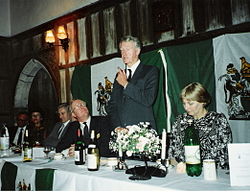 Ian Smith makes a point at a dinner organised in his honour by The Hon. Denis Walker (far left) at Lympne Castle, Kent, 23 July 1990. Smith is flanked by Nicholas and Ann Winterton, both MPs, and Rhodesian flags.
Ian Smith makes a point at a dinner organised in his honour by The Hon. Denis Walker (far left) at Lympne Castle, Kent, 23 July 1990. Smith is flanked by Nicholas and Ann Winterton, both MPs, and Rhodesian flags.
The club opposed what it described as the "premature" independence of Kenya, and the breakup of the Central African Federation, which was the subject of its first major public meeting in September 1961.[31] It was fundamentally opposed to decolonisation, and defended white minority rule in South Africa and Rhodesia.
During the Unilateral Declaration of Independence (UDI) period in Rhodesia, the club strongly backed the government of Ian Smith and the Rhodesian Front, being seen as its strongest supporters in Britain. In November 1963, the club had hosted a large reception for Smith at the Howard Hotel in London. That was followed the next year by receptions for Clifford Dupont and Moise Tshombe. The Club continued its support for white minority rule in South Africa with Lauder-Frost organising a large dinner in central London, on 5 June 1989, for their guest-of-honour Dr. Andries Treurnicht, Leader of the Conservative Party of South Africa, and his delegation. Tim Janman, MP, and the Lord Sudeley were amongst those present from parliament.[32]
Croatia
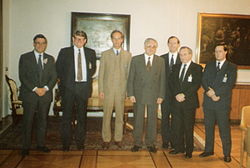 Meet the President: The Monday Club delegation to Croatia, 12 October 1991: L to R: Roger Knapman, MP, Andrew Hunter, MP, Count Nikolai Tolstoy, President Franjo Tuđman, Gregory Lauder-Frost, The Hon. Denis Walker, Rod Morris.
Meet the President: The Monday Club delegation to Croatia, 12 October 1991: L to R: Roger Knapman, MP, Andrew Hunter, MP, Count Nikolai Tolstoy, President Franjo Tuđman, Gregory Lauder-Frost, The Hon. Denis Walker, Rod Morris.
The government of Franjo Tuđman in Croatia invited the Monday Club to send a delegation to observe their conflict with Serbia, in October 1991, when the Serbian Orthodox minority in the Roman Catholic-dominated country refused to recognise Tuđman's nationalist government.[33][34] It was the first British political delegation to go to Croatia during the conflict.[35]
 The Hon. Denis Walker & Andrew Hunter MP on the Croatia-Serbia front line as part of the Monday Club delegation, 12 October 1991
The Hon. Denis Walker & Andrew Hunter MP on the Croatia-Serbia front line as part of the Monday Club delegation, 12 October 1991
European Union
Debate within the Club was intense on the European issue. In the early days of the EEC one of the Club's MPs, Geoffrey Rippon, was so pro-EEC that he was known as 'Mr Europe'. Because of the divisions within the Club on this issue the decision was taken not to have a policy on it. However, by 1980 the mood had changed. A Club Discussion Paper in October 1980 was entitled Do Tories Really want to Scrap 80% of Britain's Fishing Fleet, and the Club adopted a firm anti-EU position. Teddy Taylor MP, an anti EEC man, became Chairman of the Club's EEC Affairs Policy Committee and authored a Club Policy Paper in December 1982 entitled Proposals to Rescue the British Fishing Industry. The Club's Scottish branch's newspaper, The Challenger, carried a further article against the EU by Taylor in September 1985 entitled Swallowing the Nation, and Enoch Powell also spoke against the EU at one of the Club's fringe meetings at the Conservative Party Conference at Blackpool on 8 October 1991, with Lauder-Frost presiding, which was filmed and broadcast on BBC TV's Newsnight that night. In 1992 the Chairman, Dr. Mark Mayall, authored another Club booklet entitled: Maastricht: The High Tide of European Federalism, a fierce attack on the EU.
Immigration
In September 1972, the club held a "Halt Immigration Now!" public meeting in Westminster Central Hall, opposite Parliament, at which the speakers Ronald Bell, QC, MP, John Biggs-Davison, MP, Harold Soref, MP, and John Heydon Stokes, MP, (all club members) called on the government to halt all immigration, repeal the Race Relations Act, not the separate Commonwealth Immigrants Act 1968, and start a full repatriation scheme. A resolution was drafted, approved by the meeting, and delivered to the Prime Minister, Edward Heath, who replied that "the government had no intention of repealing the Race Relations Act". When Reginald Maudling resigned from the Cabinet, the Liberal leader, Jeremy Thorpe, commented that "Mr. Heath has been left to wrestle with the Monday Club single-handed."[36]
In October 1982, the Monday Club published its latest, slightly revised, policy on immigration. It called for:
- Scrapping of the Commission for Racial Equality and Community Relations Councils.
- Repeal of the race relations laws.
- An end to the use of race or colour as criteria for the distribution of state benefits & loans.
- An end to positive discrimination and all special treatment based upon race or colour.
- An end to all further large-scale permanent immigration from the New Commonwealth.
- An improved repatriation scheme with generous resettlement grants for all those from New Commonwealth countries who wish to take advantage of them.
- The redesignation of the Ministry of Overseas Aid as a Ministry for Overseas Resettlement.
The Club's position on immigration was reiterated in a letter in The Times from Lauder-Frost on the Club's behalf in October 1991 where he stated that the annual levels of immigration "were unacceptable" and called for "the strictest possible entry to Britain for those of other cultures."[37]
Northern Ireland
Following an Official Irish Republican Army (IRA) bombing at Aldershot, Hampshire, in February 1972, club member and MP Jill Knight called for legislation to outlaw the Official IRA and its political wing, Official Sinn Féin. The club was opposed to the dismantling of the Stormont government in Northern Ireland and the imposition of direct rule.[38] On 7 September 1989, Lauder-Frost, on behalf of the Club, denounced "the disgraceful Anglo-Irish Agreement" in The Sun.
Controversies and criticism
The club has been described as "far-right" by journalists in newspapers across the political spectrum from The Daily Telegraph to The Guardian and, in 2002, as a "bastion on the Tory hard right" by the British Broadcasting Corporation.[39] The Guardian claimed in 1968 that the organisation was "probably the nearest British equivalent to the American John Birch Society".[40]
It was claimed by opponents of the club that many members had drawn closer to the National Front, it being reported as early as 1973 that NF members were moving to take over branches of the club.[41] Thurlow, however, stated that it was doubted that members of the Monday Club were secret or even potential nazis.[42] Nevertheless the bad publicity led to a series of purges, mainly in Club branches.[43]
On 24 February 1991, The Observer ran a lengthy article entitled "Far Right takes over the Monday Club", stating that a number of senior members had tendered their resignations in protest at the Club's "takeover" by "extreme right-wingers", some of whom were associated with the Western Goals Institute. The Club's solicitors, Rubenstein, Callingham & Gale, sent a formal letter of protest to the editor of the Observer about the article, and demanded a right-of-reply for the Club. The editor agreed and Lauder-Frost, writing on behalf of the Club, subsequently challenged the article's accusations in a Letter to the Editor, which was published the following Sunday. He denied that a takeover had occurred, and claimed that none of the Club's policies had changed and that its direction was consistent with its aims and historical principles.
The playwright David Edgar described the Monday Club in an academic essay as "proselytis[ing] the ancient and venerable conservative traditions of paternalism, imperialism and racism."[44]
Suspension of links by the Conservative party (2001)
Regardless of the fact that the Monday Club was a completely autonomous pressure-group and not part of the Conservative Party organisation, in 2001, Conservative Party chairman David Davis informed the club's National Executive that links between it and the party were being severed until it stopped promoting several of its (long-held and established[45]) policies such as the voluntary repatriation of ethnic minorities. Davis later told the media: "I have told them that until a number of things are concluded—particularly some concerns about the membership of the club, and a review of the club's constitution and a requirement that the club will not promulgate or discuss policies relating to race—the club is suspended from any association with the Conservative party".[46] Three MPs, Andrew Hunter, Andrew Rosindell and Angela Watkinson, were ordered to resign from the club.
On the 10 May 2002, the British Broadcasting Corporation reported that the club sought to restore its links with the Conservative Party.[7] At the following Club Annual General meeting in April 2002, members approved two motions proposed by Michael Keith Smith, (also Chairman of the Conservative Democratic Alliance); one reaffirming the Club's opposition to mass immigration, and another empowering Club officers to institute legal action against the Conservative Party following the Club's 'suspension' by them. A third motion, asking the Club to call for the sacking of John Bercow, then Shadow Chief Secretary to the Treasury, and former Monday Club member, for his "hypocrisy", was defeated.[47]
The Times reported (2 June 2006) that, as the club "is now slowly nudging back into the mainstream, many members feel that it is time to return to the fold".
The Monday Club, having changed its original raison d'être as a pressure group, and whose membership is now said to be back below 600, now has very little influence on the agenda of the Conservative Party. Many of its former members subsequently joined the Conservative Democratic Alliance.
Monday Club publications
Further information: List of Conservative Monday Club publicationsNotes
- ^ Thurlow, Richard, Fascism in Britain, London, 1st edition 1987, revised reprint 2006, p.246, ISBN 1-86064-337-X where the author also refers to "traditional party supporters feeling intensly alienated by the Heath administration and made their opposition felt through their support of Enoch Powell".
- ^ The Monday Club - Organization & Membership published on the back cover of the Club's 1968 booklet Student Power by Patrick Wall, MC, MP.
- ^ Griffin, Roger, The Nature of Fascism, London, 1991, p. 161, ISBN 0-86187-112-X
- ^ "Tories cut Monday Club link over race policies." The Guardian. October 19, 2001.
- ^ The Independent - Five more names go in purge of Tory right[dead link]
- ^ "Tories suspend link with Monday Club." BBC News. October 18, 2001.
- ^ a b Right-wing club appeals for Tory return." BBC News. May 10, 2002.
- ^ Monday Club membership application form.
- ^ Seyd, Patrick, Factionalism within the Conservative Party: The Monday Club in Government and Opposition, volume 7, no. 4., 1972.
- ^ Policy and Aims. The Monday Club, December 1961.
- ^ The Aims of the Monday Club, Executive Council publication, Monday Club, 1970, p. 1.
- ^ Copping, Robert, The Story of The Monday Club - The First Decade, Current Affairs Information Unit, London, April 1972: 5.
- ^ Copping, 1972, p. 5.
- ^ Copping, 1972, p. 7.
- ^ a b Copping, 1972, p. 26.
- ^ Messina, Anthony M., Race and Party Competition in Britain, Clarendon Press, 1989, p. 138, ISBN 0-19-827534-X
- ^ a b Copping, 1972, p. 21.
- ^ (cf. Messina, p. 138)
- ^ a b Copping, 1972, p. 22.
- ^ Copping, Robert, The Monday Club - Crisis and After, Current Affairs Information Unit, London, May 1975
- ^ The Daily Telegraph, 12 January 1990, p. 16.
- ^ The Independent, 13 January 1990, article: "Tsar's heir plans for day of Restoration".
- ^ Monday Club News, January 1991 (circular)
- ^ Mail on Sunday, 3 February 1991
- ^ The Observer, 24 February 1991, major article by David Rose.
- ^ Searchlight (magazine), London, March & June 1991 editions
- ^ Club Minutes
- ^ The Independent, 4 March 1990.
- ^ The Daily Telegraph and The Times, Court & Social pages, both on 26 September 1989.
- ^ The Daily Telegraph, Court & Social columns, 27 October 1988.
- ^ Copping, 1972 p.6
- ^ The Daily Telegraph and The Independent, Court & Social columns, 6 June 1989.
- ^ The Daily Telegraph, 7/12/2002
- ^ The Daily Telegraph, 13/9/2003
- ^ Times, 5 May 1992, carried a letter from Gregory Lauder-Frost on behalf of the Club about this delegation and its findings.
- ^ Copping, 1975, pp. 6–7.
- ^ The Times (letters), 9 October 1991.
- ^ Copping, 1975, pp. 5, 6, 9.
- ^ [1]
- ^ Powell and His Allies, Labour Research Department, (p. 12) 1969.
- ^ Time - Bloody Monday
- ^ Thurlow, 2006, p. 251.
- ^ Copping, 1975
- ^ Levitas, Ruth, (editor), The Ideology of the New Right, Cambridge, 1986, p. 60, ISBN 0-7456-0190-1
- ^ Messina, 1989, p. 138
- ^ The Guardian - Tories cut Monday Club link over race policies
- ^ The Independent, 18 May 2002.
References
- Copping, Robert, No Punches Pulled - Britain Today, Current Affairs Information Service (CAIS), Ilford, Essex, n/d but probably circa 1970 (P/B).
- Copping, Robert, The Story of The Monday Club - The First Decade, (i) (Foreword by George Pole), Current Affairs Information Service, Ilford, Essex, April 1972 (P/B).
- Copping, Robert, The Monday Club - Crisis and After, (foreword by John Biggs-Davison, MP), (ii) CAIS, Ilford, May 1975 (P/B).
- Rose, Professor Richard, Politics in England - Persistence and Change, London, 1st published 1965. 4th edition 1985, p.301, ISBN 0-571-13830-6
- Heffer, Simon, Like the Roman - The Life of Enoch Powell, London, 1998, ISBN 0-297-84286-2 (many references to the Monday Club).
- Coxall, Bill, and Lynton Robins, Contemporary British Politics, Macmillan Press, Basingstoke, 1993 reprint, (P/B), Monday Club profile on p.239. ISBN 0-333-34046-9
External links
Categories:- Conservative political pressure groups of the United Kingdom
- Political and economic think tanks based in the United Kingdom
- Foreign policy and strategy think tanks based in the United Kingdom
- Anti-communist organizations
- Euroscepticism in the United Kingdom
- 1961 establishments in the United Kingdom
- Organisations associated with the Conservative Party (UK)
Wikimedia Foundation. 2010.



